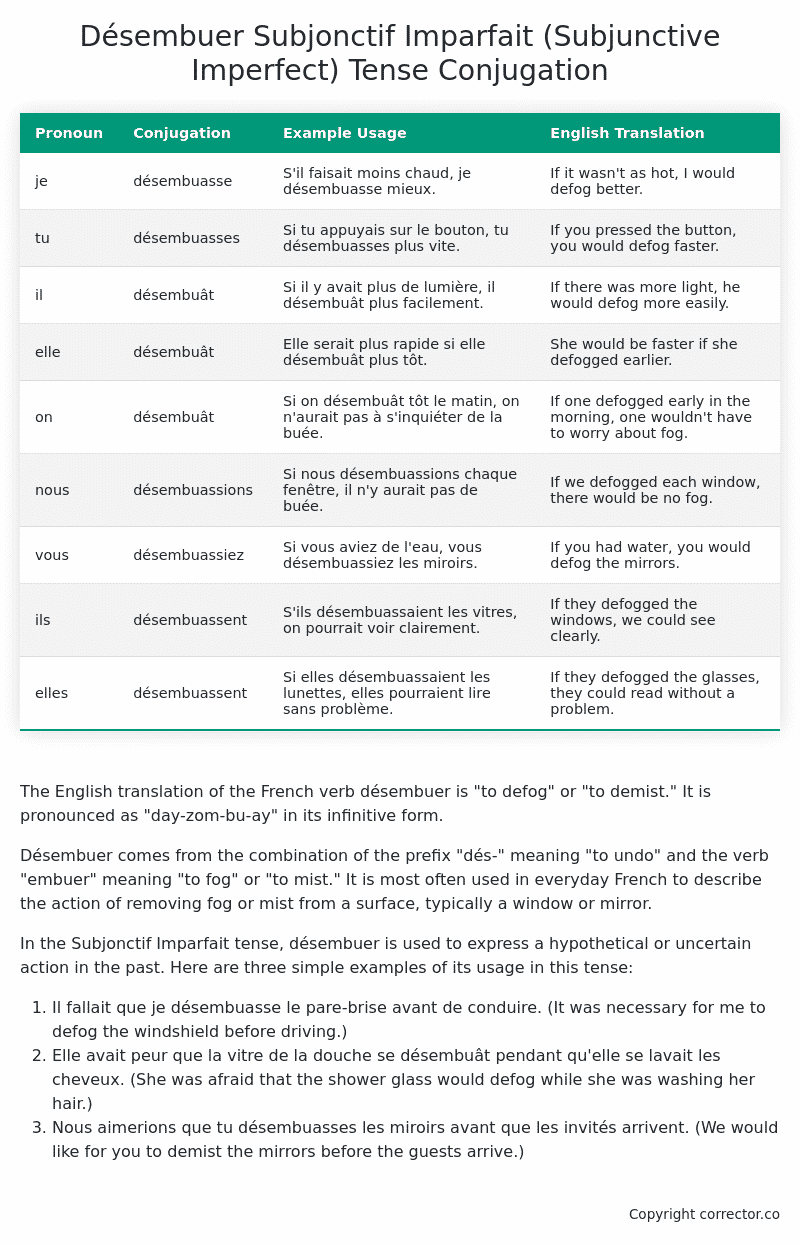Subjonctif Imparfait (Subjunctive Imperfect) Tense Conjugation of the French Verb désembuer
Introduction to the verb désembuer
The English translation of the French verb désembuer is “to defog” or “to demist.” It is pronounced as “day-zom-bu-ay” in its infinitive form.
Désembuer comes from the combination of the prefix “dés-” meaning “to undo” and the verb “embuer” meaning “to fog” or “to mist.” It is most often used in everyday French to describe the action of removing fog or mist from a surface, typically a window or mirror.
In the Subjonctif Imparfait tense, désembuer is used to express a hypothetical or uncertain action in the past. Here are three simple examples of its usage in this tense:
- Il fallait que je désembuasse le pare-brise avant de conduire. (It was necessary for me to defog the windshield before driving.)
- Elle avait peur que la vitre de la douche se désembuât pendant qu’elle se lavait les cheveux. (She was afraid that the shower glass would defog while she was washing her hair.)
- Nous aimerions que tu désembuasses les miroirs avant que les invités arrivent. (We would like for you to demist the mirrors before the guests arrive.)
Table of the Subjonctif Imparfait (Subjunctive Imperfect) Tense Conjugation of désembuer
| Pronoun | Conjugation | Example Usage | English Translation |
|---|---|---|---|
| je | désembuasse | S’il faisait moins chaud, je désembuasse mieux. | If it wasn’t as hot, I would defog better. |
| tu | désembuasses | Si tu appuyais sur le bouton, tu désembuasses plus vite. | If you pressed the button, you would defog faster. |
| il | désembuât | Si il y avait plus de lumière, il désembuât plus facilement. | If there was more light, he would defog more easily. |
| elle | désembuât | Elle serait plus rapide si elle désembuât plus tôt. | She would be faster if she defogged earlier. |
| on | désembuât | Si on désembuât tôt le matin, on n’aurait pas à s’inquiéter de la buée. | If one defogged early in the morning, one wouldn’t have to worry about fog. |
| nous | désembuassions | Si nous désembuassions chaque fenêtre, il n’y aurait pas de buée. | If we defogged each window, there would be no fog. |
| vous | désembuassiez | Si vous aviez de l’eau, vous désembuassiez les miroirs. | If you had water, you would defog the mirrors. |
| ils | désembuassent | S’ils désembuassaient les vitres, on pourrait voir clairement. | If they defogged the windows, we could see clearly. |
| elles | désembuassent | Si elles désembuassaient les lunettes, elles pourraient lire sans problème. | If they defogged the glasses, they could read without a problem. |
Other Conjugations for Désembuer.
Le Present (Present Tense) Conjugation of the French Verb désembuer
Imparfait (Imperfect) Tense Conjugation of the French Verb désembuer
Passé Simple (Simple Past) Tense Conjugation of the French Verb désembuer
Passé Composé (Present Perfect) Tense Conjugation of the French Verb désembuer
Futur Simple (Simple Future) Tense Conjugation of the French Verb désembuer
Futur Proche (Near Future) Tense Conjugation of the French Verb désembuer
Plus-que-parfait (Pluperfect) Tense Conjugation of the French Verb désembuer
Passé Antérieur (Past Anterior) Tense Conjugation of the French Verb désembuer
Futur Antérieur (Future Anterior) Tense Conjugation of the French Verb désembuer
Subjonctif Présent (Subjunctive Present) Tense Conjugation of the French Verb désembuer
Subjonctif Passé (Subjunctive Past) Tense Conjugation of the French Verb désembuer
Subjonctif Imparfait (Subjunctive Imperfect) Tense Conjugation of the French Verb désembuer (this article)
Subjonctif Plus-que-parfait (Subjunctive Pluperfect) Tense Conjugation of the French Verb désembuer
Conditionnel Présent (Conditional Present) Tense Conjugation of the French Verb désembuer
Conditionnel Passé (Conditional Past) Tense Conjugation of the French Verb désembuer
L’impératif Présent (Imperative Present) Tense Conjugation of the French Verb désembuer
L’infinitif Présent (Infinitive Present) Tense Conjugation of the French Verb désembuer
Struggling with French verbs or the language in general? Why not use our free French Grammar Checker – no registration required!
Get a FREE Download Study Sheet of this Conjugation 🔥
Simply right click the image below, click “save image” and get your free reference for the désembuer Subjonctif Imparfait tense conjugation!

Désembuer – About the French Subjonctif Imparfait (Subjunctive Imperfect) Tense
Formation
Common Everyday Usage Patterns
Interactions with Other Tenses
Subjonctif Présent
Indicatif Passé Composé
Conditional
Conditional Perfect
Summary
I hope you enjoyed this article on the verb désembuer. Still in a learning mood? Check out another TOTALLY random French verb conjugation!


